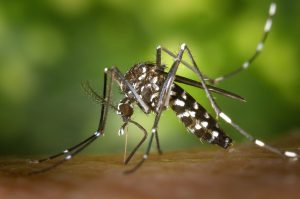Everyone I know has been breathing a sigh of relief for the rain that has filled our wells and reservoirs, while bracing for the impact of summer sunshine on the waterlogged landscape. If you haven’t already lined someone up to take care of the weed whacking, you may want to get that on your “to do” list.
A few weeks ago I wrote about the potential for an increase in the deadly hantavirus which can result from a rodent baby boom. While I don’t want to sound like a doomsayer, hantavirus isn’t the only virus we need to protect ourselves from. Mosquitoes are already making an appearance and they’re not just annoying.
Sometimes, they can be deadly.
If you’ve taken a walk near wetlands or streams in the last few days, you may have experienced the mosquitoes’ already-prodigious presence. It’s hard to hike anywhere near water without being swarmed and, thanks to rainfall, standing water is almost everywhere.
 Mosquitoes require standing water in which to hatch the eggs that develop into blood-sucking creatures that make hiking around water so annoying. However, the annoying part of swarming mosquitoes is benign compared to the diseases they can pass along to humans, such as the Zika virus and West Nile virus.
Mosquitoes require standing water in which to hatch the eggs that develop into blood-sucking creatures that make hiking around water so annoying. However, the annoying part of swarming mosquitoes is benign compared to the diseases they can pass along to humans, such as the Zika virus and West Nile virus.
The Zika virus showed up in California in 2011 and can cause flu-like symptoms in some people, while many who are exposed to the virus never experience symptoms. Pregnant women need to be particularly careful to avoid exposure because the virus may cause birth defects. More information about the Zika virus.
The other mosquito borne virus to be concerned about this season is the West Nile virus. When you’ve been exposed West Nile, you are much more likely to experience flu-like symptoms than with the Zika virus. Sometimes, those symptoms can drag on for weeks. More information on the West Nile virus.
 At this time, there is no vaccine for either virus. Treatment is focused on controlling the symptoms you experience. For most people, exposure to Zika or West Nile will cause minimal symptoms, except in those who are pregnant or have chronic health concerns such as diabetes or heart disease or other serious issues.
At this time, there is no vaccine for either virus. Treatment is focused on controlling the symptoms you experience. For most people, exposure to Zika or West Nile will cause minimal symptoms, except in those who are pregnant or have chronic health concerns such as diabetes or heart disease or other serious issues.
If you believe you’ve been exposed and and have contracted one of these viruses, you need to see a doctor immediately.
Mosquitoes are active throughout daylight hours and into the evening. The Center for Disease Control recommends that mosquito repellent be used to prevent being bitten. Repellents that contain DEET are the most effective, they say, but DEET can cause problems when sprayed directly on the skin or inhaled.
You may want to weigh your risk of exposure to the virus with your risk of exposure to the chemicals found in traditional repellents. There are other ways to minimize your chance of mosquitoes that don’t involve harsh chemicals:
- Remove standing water from around your yard, including birdbaths, flower pots, buckets and trash cans.
- Wear clothing that covers your full body and limbs. Athletic wear with a tight weave in a light color may be more resistant to mosquitoes than cotton or linen and darker colors.
- When you are enjoying the backyard, think about having a fan nearby. Mosquitoes cannot fly in wind, so an oscillating fan set on low will keep them away without being too intrusive.
- Citronella candles don’t work well unless you’re sitting right next to them. Better to consider landscaping with mosquito-repelling plants in your outdoor entertaining area. This could include lemon balm, catnip, peppermint, lavender and basil, which all have strong scents that mosquitoes don’t like.
 Electronic wristbands, DEET wristbands, ultrasonic devices and other high tech gear designed to keep mosquitoes away seem to be ineffective, so don’t waste your money.
Electronic wristbands, DEET wristbands, ultrasonic devices and other high tech gear designed to keep mosquitoes away seem to be ineffective, so don’t waste your money.
With a little preparation you can still enjoy your outdoor time with low risk of mosquito bites and the viruses they carry.
Virginia Eaton is a health and fitness coach helping people reorganize priorities.




